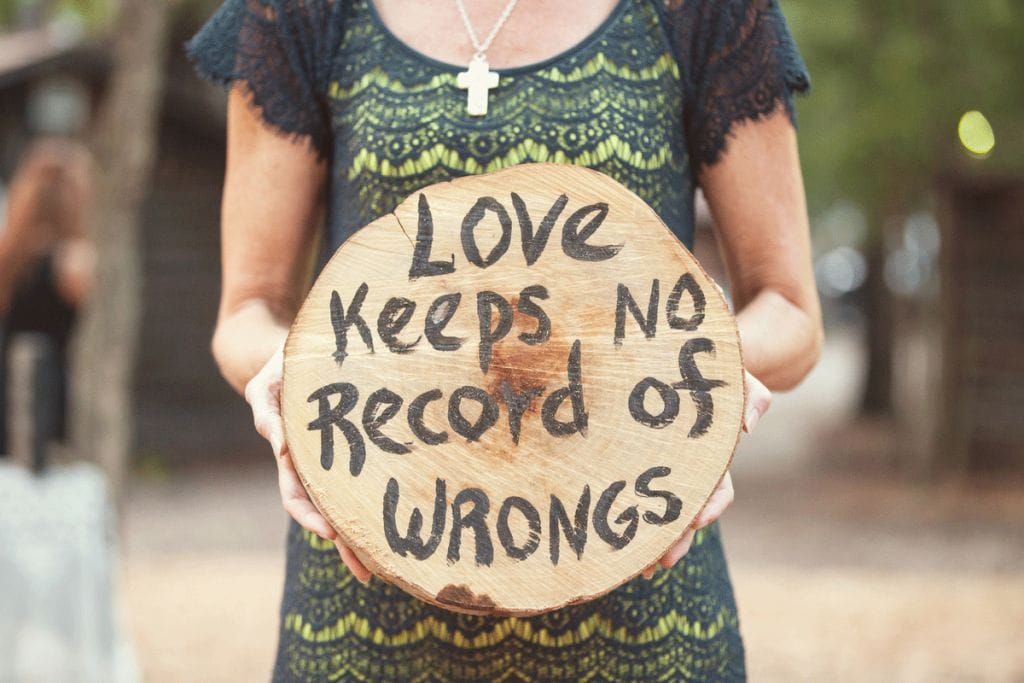Forgiving others when we have been hurt or wronged is hard. No question! So where do we begin? How do we love and forgive when we’ve been wronged?
As we continue our study of learning to walk in love, let’s compare 1 Corinthians 13:5b with the mutuality commands (one anothers) found in Ephesians 4.
Love..is not easily angered, it keeps no record of wrongs. —1 Corinthians 13:5b (NIV)
Love…is not irritable or resentful. —1 Corinthians 13:5b (ESV)
Be kind to one another, tenderhearted, forgiving one another, as God in Christ forgave you. —Ephesians 4:32
LOVE is not irritable or resentful so WALK being kind and forgiving.
Look at the words from this verse in the original language of the New Testament:
-
- irritable – to easily provoke, irritate, arouse to anger, or to exasperate.
-
- resentful/keeps no record of wrongs – to put together with one’s mind, to count, to occupy oneself with calculations; bad or worthless, wicked, vicious in heart, conduct and character; to be hurtful or harmful. Resentful is actually two words which translates “think no evil”.
When I walk irritable and resentful with unforgiveness in my heart and nursing a grudge or hurt, I am easily provoked to anger by almost anything. I am easily exasperated. I tend to occupy myself with rehearsing the hurt, being resentful, and recounting the ways I’d like to retaliate. But God calls me to this love-walk that is about being kind and forgiving.
Since love is not resentful, it does not count up wrongdoings. Instead, Ephesians 4 instructs us to be kind, tenderhearted, and forgiving toward one another.
-
- Kind – to furnish what is needed, good, gentle, and useful toward others.
-
- Tenderhearted – compassionate, sympathetic, full of compassion for the ills of others.
-
- Forgive – to grant forgiveness, graciously to restore one to another.
Let’s clear up a few things regarding forgiveness.
Forgiveness does not:*
-
- Excuse sin
- Release offenders from the need to take personal responsibility
- Absolve offenders from guilt
- Deliver offender from consequences of actions
- Erase the past
- Always restore a relationship
Forgiveness:*
-
- Releases the offender from the consequences of their behavior as it affects me
- Takes time. We begin the process by admitting our hurt, feeling the pain and voicing the outrage
- Is an act of mercy and grace
“Forgiveness is like the growth of a tree that envelops a wound in the trunk so that what once threatened the tree’s life becomes its place of greatest strength.” —*Gerald Sittser, Love One Another: Becoming the Church Jesus Longs For
Holding onto an offense does nothing to “punish” the offender, instead, it creates resentment, bitterness, and bondage in our own lives. Extending forgiveness to those who have wronged us benefits us more than it does them. Unforgiveness is toxic to our souls. Unforgiveness allows bitterness to take root deep within our hearts and souls affecting our outlook, attitude, and other relationships. Forgiveness frees me from the “yuck” of irritability, resentment, and bitterness that manifest themselves in my life when I choose to hold onto an offense.
“A life spent practicing unforgiveness toward those who have wounded us feeds that malignant growth in our soul, hinders our capacity for healthy relationships and binds us in the oppressive chains of anger, suspicion, resentment, and fear.” —Todd Morrison
Forgiveness is not easy. It can take time to process the pain and forgive. But it IS possible because we have the Spirit of God dwelling in us. It is His presence that comforts us as we grieve and work through our pain. It is His power that enables us to extend grace and forgiveness.
There is freedom, joy, and contentment in forgiveness. And I have to remind myself—I have been forgiven MUCH by the grace and mercy of God.
Bear with each other and forgive one another if any of you has a grievance against someone. Forgive as the Lord forgave you. —Colossians 3:13 (NIV)
This love-walk is always about the overflow of my love relationship with Christ. He accepts me as I am and He changes me completely— for my good and His glory!
Rejoicing in Him!

For further study on this topic, a seven-week Bible study titled, Walk in Love: Learning to Love Others Better is available for purchase on Amazon.
©2013 Susan Cady, Walk in Love, susancady.com

